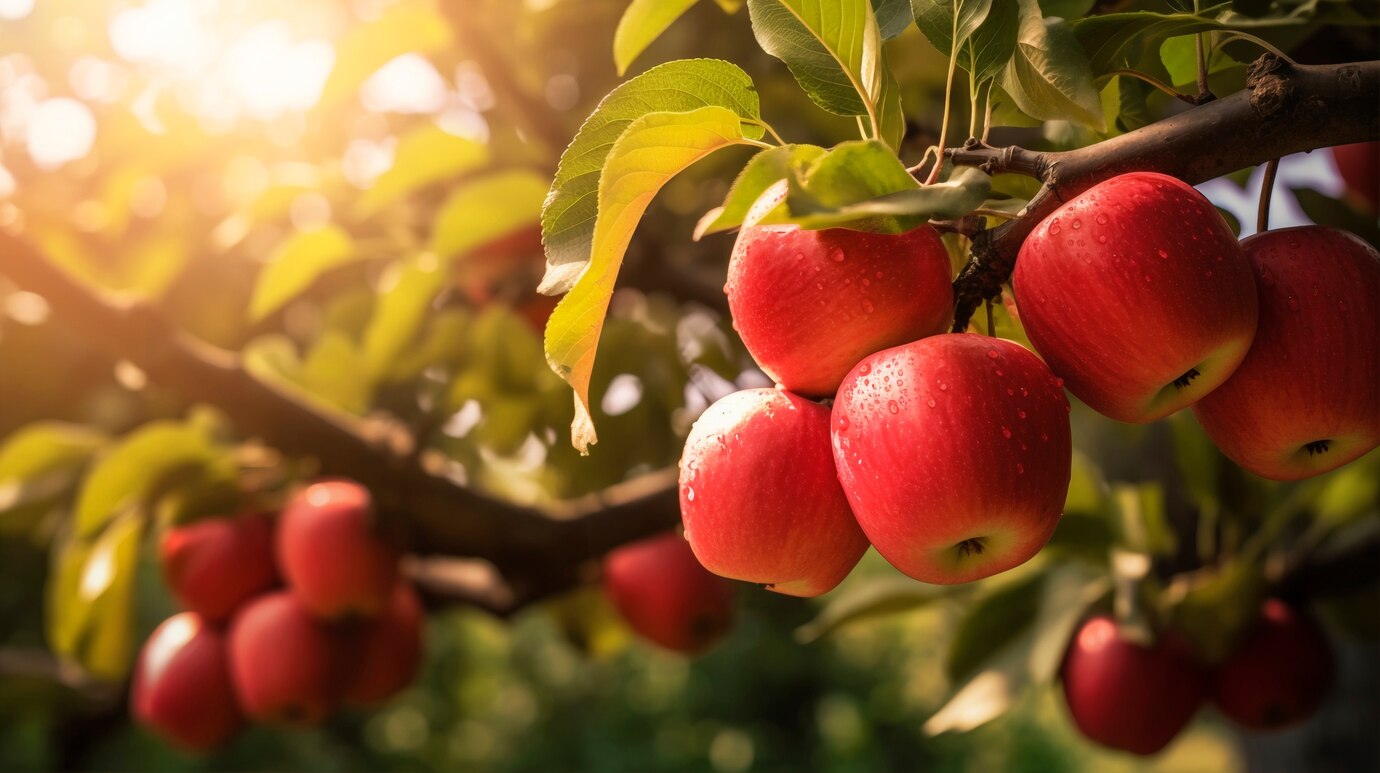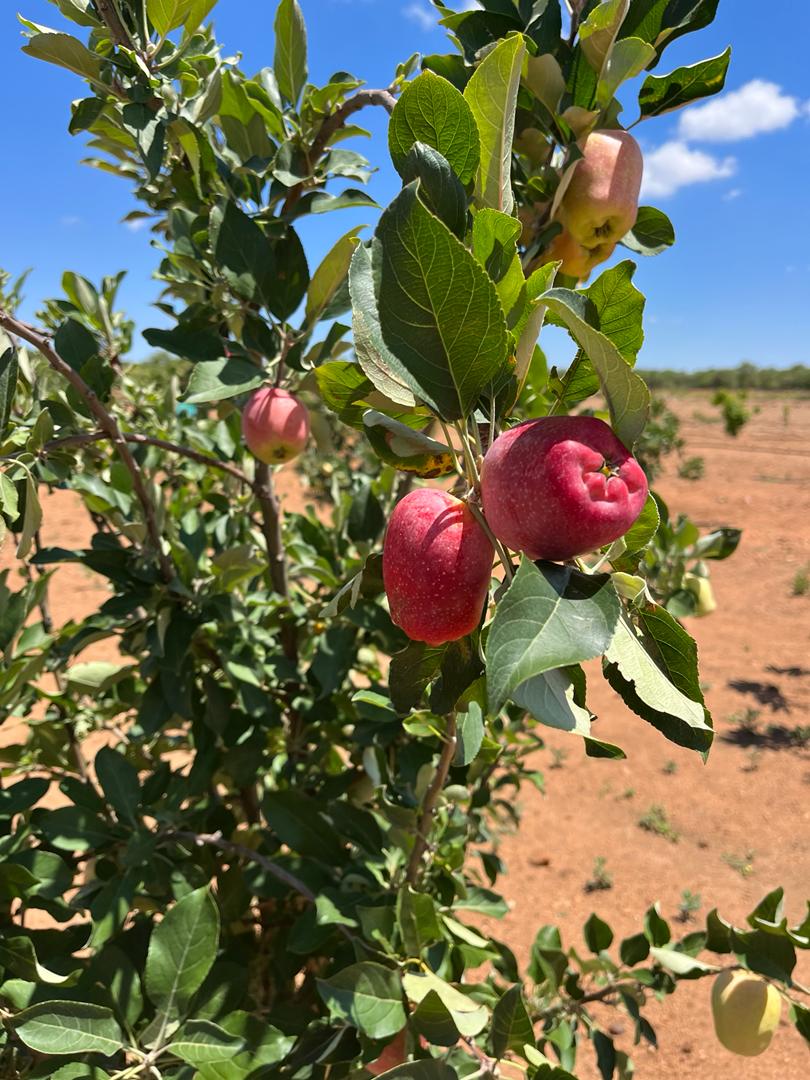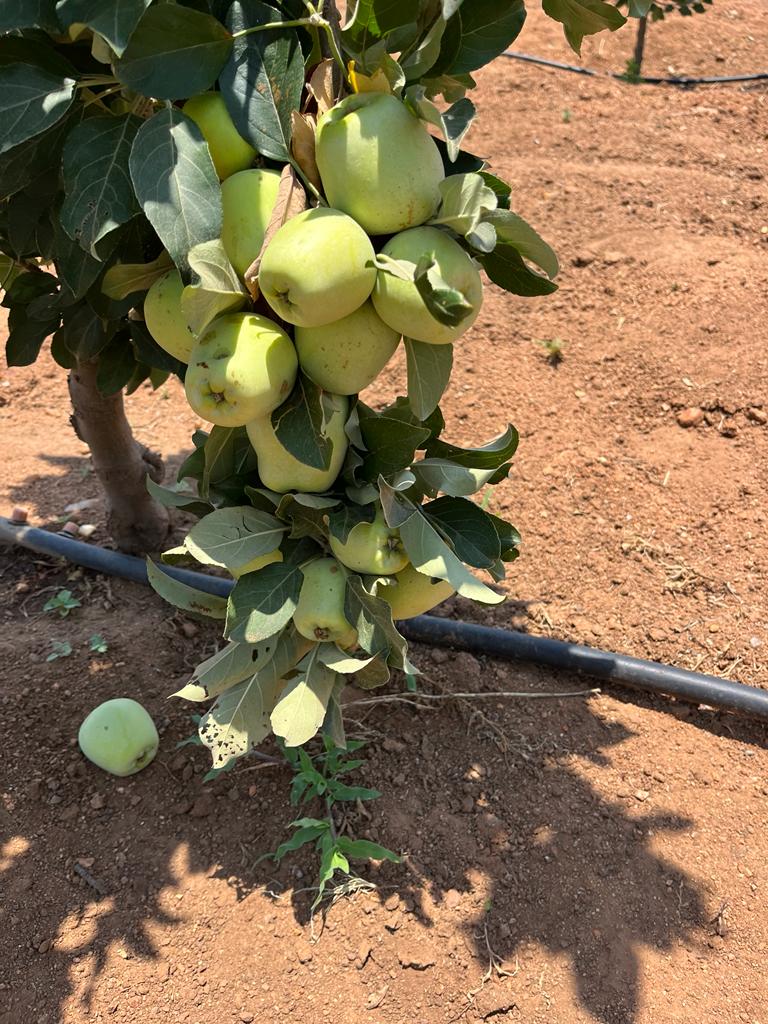If Ipeleng Ramatlhakwane from Malolwane, east of Gaborone in Botswana, gets her way, the whole strip of land running just a kilometre away from the banks of the Madikwe/Marico River on the border with South Africa would be fully utilised for farming. One of the crops she is putting her trust in is apples.
Growing apples in the hot and arid conditions in Botswana may seem a bit far-fetched, but Ipeleng has already proven that it can work.
She says: “Because we are so close to the river it gets very cold here in winter, with frost. It gets cold enough for the resting period apple trees need, but it is also important to use the right cultivar.”
The cultivar she decided upon is a very hardy type she imported from Kenya, just known as Semi-arid.
“The best thing is that the root stock trees this hardy cultivar is grafted on, was developed in Israel. From desert country to desert country, we can make it work!”

Ipeleng at her favourite apple tree planted in 2021. Between the trees are traditional runner beans planted as cash crops, to control weeds and to replenish nitrogen in the soil.
Ipeleng has now taught herself to use sprouts from the root stock trees to graft the fertile fruit bearing apple trees on. The plan is to sell these saplings to other farmers ready to take on a crop with long term returns.
She says there is a high demand for apples in Botswana and up to now they had to import most of what they needed from South Africa and other countries. Now this can all change.
Ipeleng was quite surprised when the first batch of trees she imported started bearing fruit after nine months.
“I did not think it was possible, on the second year we pruned them just enough hoping that nature will take its cause. When it rains, generally weaker flowers will easily fall off, however the scarcity of rain during this period resulted in a high yield which was not anticipated. This considering the stems are still in a fragile state. In the end I had to rush around finding buyers for all the apples. We ended up processing the apples, making lots of juice, even apple cider vinegar and apple butter, and the remains and chaff were fully utilised feeding our horses … and they were very happy.”

At Wipix Gardens, about 80 km from Gaborone, Ipeleng Ramatlhakwane is opening a door to new opportunities for farmers in Botswana.
She is ready now for the next season, but the long-term aim is to provide and sell trees to other farmers.
On her farm, Wipix Gardens, which is about 10 km from the village where she and her husband own the luxurious Wipix guesthouse, many other experiments and farming activities are also taking place.
Between the cattle, goats, sheep horses, and lavender lands there is a patch with a variety of trees, including bananas, moringa, figs, pomegranates, and other crops, such as Australian mint. This is where Ipeleng tries out everything before growing it commercially.
It is important to her that everything she grows must be organic, and although it is sometimes a challenge to find solutions, she tries her utmost to work with nature. Giving a plant the best possible start in life is also the best way to safeguard it against pests, she says.
When planting a tree, a proper hole is dug which is first filled with a layer of river sand, which the ants do not use to build nests, then ash as a natural pesticide, and lastly a good mix of mature kraal manure and healthy compost. She also likes to use rabbit manure which she gets from her own rabbit farming sideline, as it can be used directly without damaging the plants.
- The first harvest arriving nine months after the trees were planted came as a surprise to all involved. Now things are controlled by pruning and limiting flowers.
- With drip irrigation and the right cultivar, apples can grow in arid conditions.
She had an infestation of beetles in her trees a while ago, but she beat the beetles by drawing them away from the trees at night using big bright lights above containers filled with water in which they then fell and drowned. Burning dry manure is another weapon in her natural arsenal.
Ipeleng says there is no excuse for people who have some land not to farm.
Even the availability of water does not have to be an obstacle. Once you have done a survey the government is willing to fund up to 65% of drilling costs and infrastructure if the water is being used for farming. In the strip next to the river, they also have access to the beautiful clean water of the perineal rivers, of course with water rights.
Most excitingly, for young people looking for smart farming, and the use of technology instead of getting their hands dirty she also has an answer. She has just finished installing an aquaponic system on the roof of her newly completed spa, which will enhance the already superb culinary experience of guests staying over.
“We are well-known for our quality bream,” she says, “now we can provide our own aquaponically grown fish, as well as healthy vegetables and spicy herbs.”
Although the system at the guesthouse is small, they are considering in-stalling a commercial Kleinskuur aquaponics unit on the farm. In the end the farm will also be a tourist destination displaying a variety of interesting crops and farming methods.
Ipeleng has a background in financial services, but she gave up her corporate career in investment consulting to pursue her passion to create a beautiful environment for people, plants, and animals to thrive and grow in.

This is one of the new trees Ipeleng has grafted using sprouts from root stock trees.
Her husband, Cornelius, has a very demanding position and must travel a lot as CEO of Botswana Post, so running the farm, the guest house and even tackling construction work to expand their guest house is all up to Ipeleng. She does it with a smile because she says her time is now her own.
Seeing things grow and bear fruit makes her happy. “But I am not planting onions again,” she laughs, explaining that she got stuck with 35 000 bags of onions grown on three hectares because the buyer she relied on dropped her. She says she would rather focus on getting contracts for unique and interesting produce that not many people grow, in order to get a good price.
“Agriculture is a compulsory subject in public schools. Everyone attending public school in Botswana should have a basic knowledge of farming practices. The government also has many funding opportunities, for instance they funded 50% of the fencing around this camp. One can apply once every financial year to expand your activities.”- Ipeleng Ramatlhakwane

Colin Bremner from Kleinskuur Aquaponics adding the final touches to this rooftop aquaponic system, which may be the first one in Botswana.











